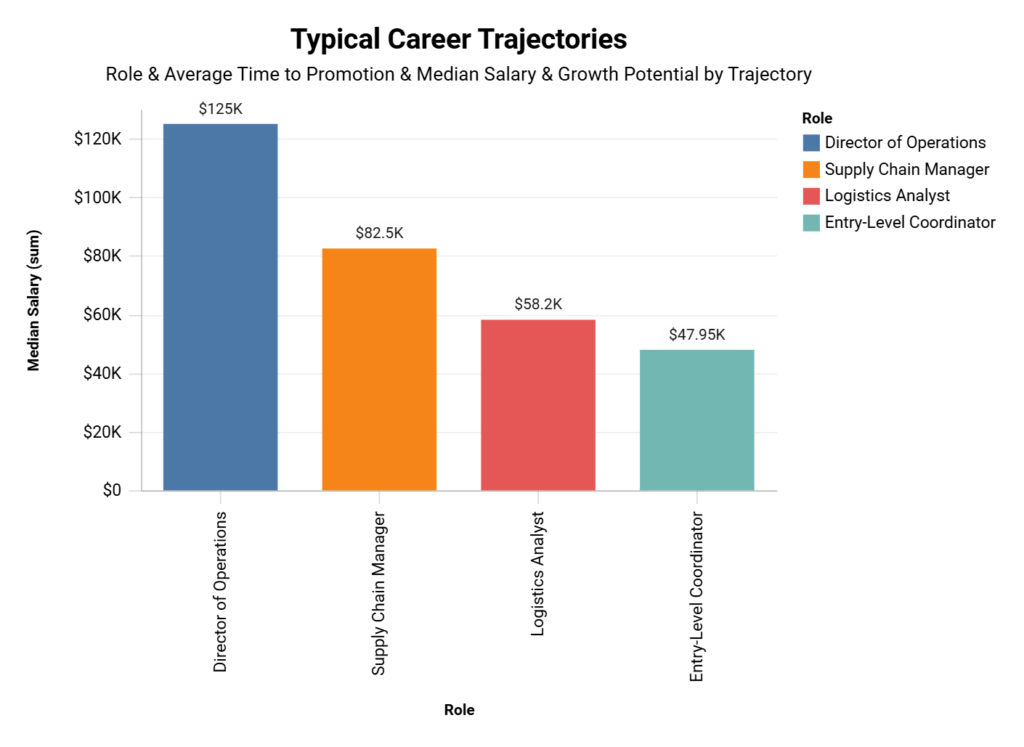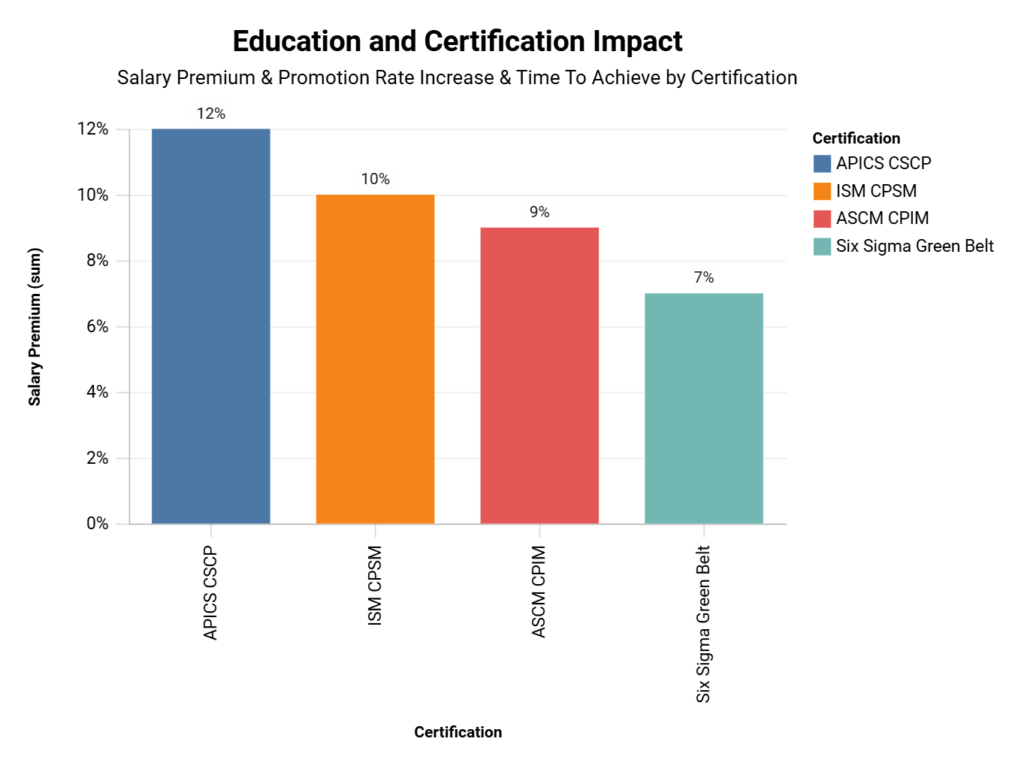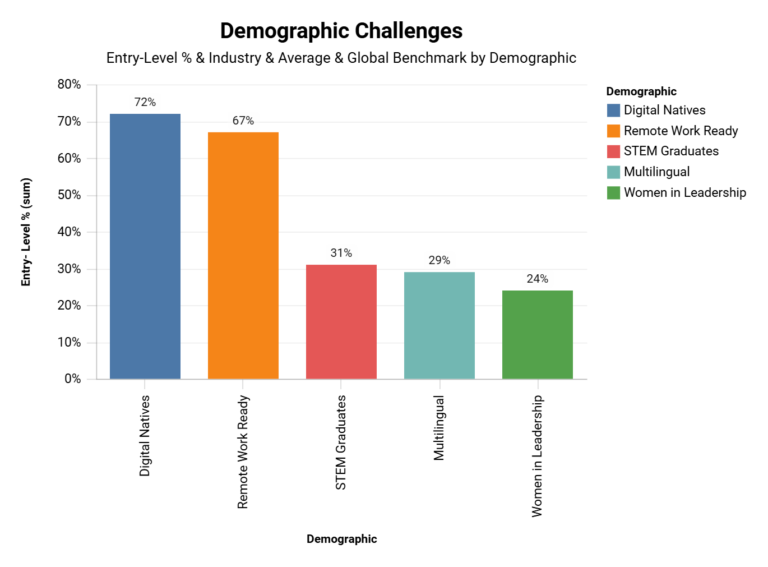Statistical Evaluation of Career Progression for Entry-Level Supply Chain Coordinators: Impact on Retention and Job Satisfaction
Career Progression for Entry-Level Supply Chain Coordinators: 2025 Data and Statistics
The supply chain sector offers significant opportunities for career advancement, but retention remains a challenge. According to a 2025 report by ASCM, 82% of supply chain professionals plan to remain in the field for the next five years. However, 39% of entry-level coordinators leave within the first two years, highlighting the need for targeted retention strategies and clearer career pathways.
This attrition is costly for companies, with Deloitte estimating that replacing a single entry-level employee costs 20-30% of their annual salary, including recruitment expenses and lost productivity.
Retention Challenges and Job Satisfaction
Retention Statistics
- 39% attrition rate among entry-level coordinators within two years (APICS 2024).
- Companies with structured career progression programs see a 27% higher retention rate (ASCM Career Report 2025).
- Poor onboarding experiences contribute to 9% of turnover in the first six months (CareerBuilder 2025).
- Firms offering mentorship programs report a 33% improvement in retention rates, especially among Gen Z employees.
Job Satisfaction Insights
- 70% of supply chain professionals rate their job satisfaction as 8 or higher on a scale of 10 (ASCM 2025).
- Key drivers of satisfaction include:
- Paid time off (88%)
- Flexible work schedules (55%)
- Clear career advancement opportunities (64%)
- Access to leadership development programs (49%)
- Dissatisfaction is most commonly linked to high workloads (46%) and lack of recognition (38%).
For a deeper dive into the supply chain industry, don’t miss our other insightful articles. Explore our Data-Driven Analysis of Entry-Level Supply Chain Coordinator Salaries to understand compensation trends. Finally, uncover actionable solutions to workforce challenges with our Data-Centric Approach to Analyzing the Skills Gap in Entry-Level Supply Chain Coordination.
Career Growth Pathways
Typical Career Trajectories in Supply Chain Management
This chart outlines common career paths in supply chain management, showcasing progression from entry-level positions to executive roles. It provides insights into average promotion timelines, median salaries, and growth potential at each stage.

| Role | Average Time to Promotion | Median Salary | Growth Potential |
|---|---|---|---|
| Entry-Level Coordinator | N/A | $47,949 | High |
| Logistics Analyst | 2-3 years | $58,200 | Moderate |
| Supply Chain Manager | 5-7 years | $82,500 | High |
| Director of Operations | 10+ years | $125,000 | High |
Emerging Roles in Supply Chain
- Sustainability Coordinator: Focuses on carbon-neutral logistics practices. Average salary: $62,500.
- Data Analyst: Uses AI tools to optimize inventory and forecast demand. Average salary: $68,000.
- E-Commerce Fulfillment Specialist: Manages last-mile delivery efficiency. Average salary: $59,800.
Fastest-Growing Specializations
- Green Logistics Management: Driven by corporate sustainability goals and ESG mandates.
- Digital Twin Integration Specialist: Facilitates real-time simulations for supply chain optimization.
- Blockchain Traceability Analyst: Ensures transparency in multi-tier supplier networks.
Factors Influencing Career Progression
Education and Certification Impact on Salary and Career Growth
This chart highlights the impact of certifications on salary premiums, promotion rates, and the time required to achieve these credentials. Certifications like APICS CSCP and ISM CPSM offer measurable benefits for supply chain professionals.

| Certification | Salary Premium | Promotion Rate Increase | Time to Achieve |
|---|---|---|---|
| APICS CSCP | +12% | +15% | 6 months |
| ISM CPSM | +10% | +13% | 6-12 months |
| ASCM CPIM | +9% | +11% | 6 months |
| Six Sigma Green Belt | +7% | +8% | 2-3 months |
Professionals with certifications are also more likely to transition into leadership roles within five years.
Gender and Diversity Insights
- Women represent 50% of supply chain coordinators, but only 24% of leadership roles (Zippia Demographics Report 2024).
- Companies with diversity programs see a 19% higher promotion rate for underrepresented groups (Deloitte Diversity Study 2025).
- Employees from diverse backgrounds report higher job satisfaction when companies offer inclusive leadership training programs.
Technology Proficiency as a Differentiator
Employers increasingly value digital skills:
- Proficiency in AI-driven analytics correlates with a 22% faster promotion rate.
- Blockchain knowledge leads to a +23% salary premium (Hyperledger Foundation Study).
- Familiarity with robotics process automation enhances productivity by 31%, making employees more likely candidates for managerial roles.
Strategies to Improve Retention and Growth
Structured Onboarding Programs
Companies with comprehensive onboarding programs retain 69% of employees beyond three years (CareerBuilder Onboarding Report 2025). Effective onboarding includes:
- Clear role expectations.
- Early exposure to cross-functional teams.
- Training on company-specific tools and processes.
Mentorship Opportunities
Mentorship programs increase promotion rates by 33% and improve job satisfaction by 29% (ASCM Career Report). Successful mentorship initiatives include:
- Pairing new hires with experienced professionals.
- Setting clear mentorship goals tied to career development.
- Offering reverse mentoring opportunities where senior staff learn from digital-savvy younger employees.
Leadership Development Initiatives
- Rotational leadership programs expose employees to multiple departments, improving decision-making skills by 41%.
- Cross-functional training enhances project management skills and prepares employees for senior roles.
- Funding for certifications boosts employee loyalty and skill development.
Technology's Role in Career Advancement
Digital Skills in Demand
Employers prioritize candidates with expertise in:
- AI-driven analytics proficiency—is required by 78% of employers (McKinsey Tech Adoption Survey 2025).
- Blockchain knowledge—correlates with a +23% salary premium.
- IoT-enabled logistics platforms—used by 61% of Fortune 500 companies.
Tools Supporting Growth
- Digital twin simulations improve decision-making skills by 42%, preparing employees for managerial roles faster (DHL Resilience Report 2025).
- VR-based warehouse management training reduces errors by 37%, increasing promotion readiness.
- Predictive analytics platforms allow coordinators to identify bottlenecks earlier, improving operational efficiency by up to 29%.
Advance your supply chain career with our specialized training programs designed to equip you with the skills needed for success in this dynamic field. Start your free introductory module today and join thousands of graduates advancing their careers in supply chain management.
Conclusion
Career progression for entry-level supply chain coordinators is heavily influenced by education, certifications, mentorship opportunities, and access to leadership development programs. By addressing retention challenges through structured onboarding and clear growth pathways, companies can foster long-term employee satisfaction and build a robust talent pipeline.





